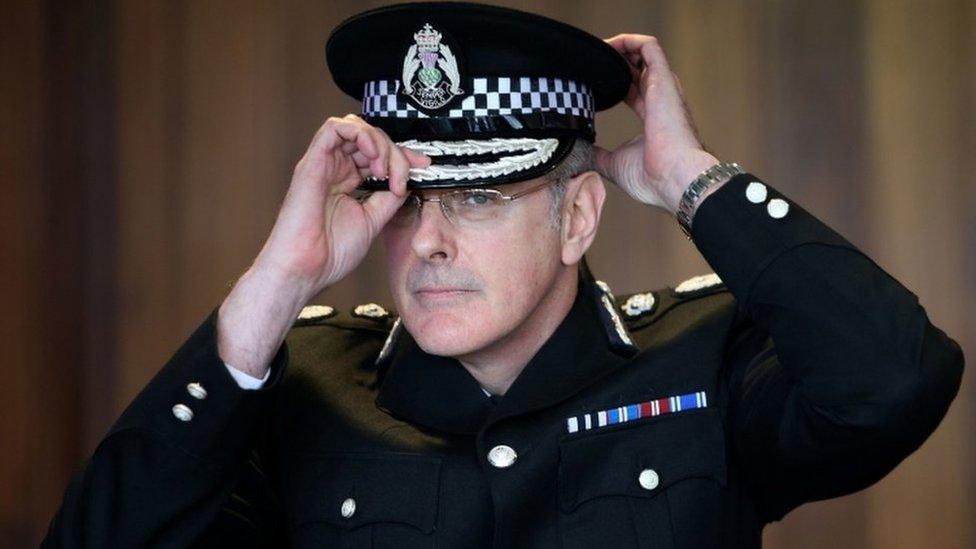Police and fire service merger review identifies 'systemic problems'
- Published
- comments
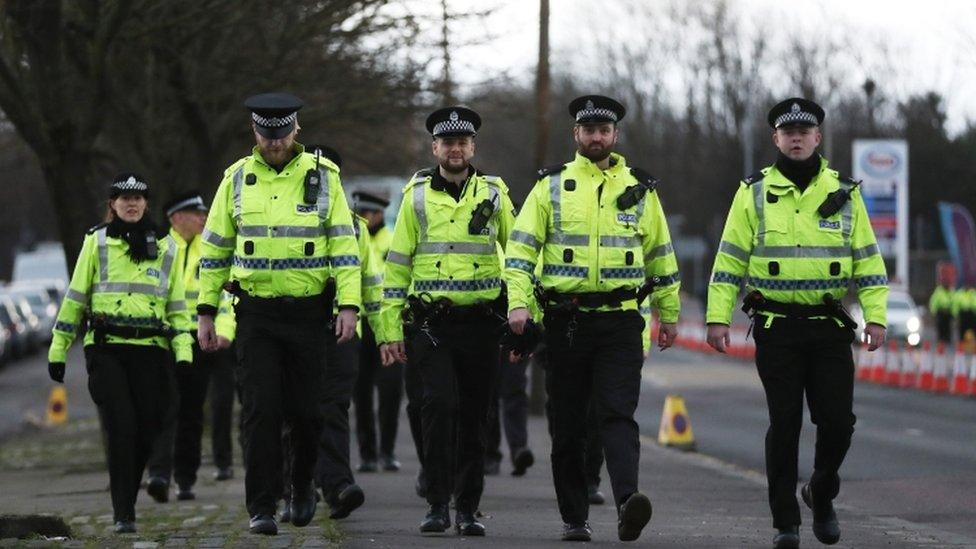
Police Scotland is the second largest force in the UK, with 17,000 officers
Improvements are needed to address "systemic problems" created when Scotland's police and fire services became national bodies, according to MSPs.
Holyrood's Justice Committee has completed a review of the reorganisation of the services.
Poor money management and personnel issues were identified as issues.
The Scottish government said the changes had brought about a more consistent and improved service.
Prior to the Police and Fire Reform (Scotland) Act 2012, the police and fire services in Scotland had each consisted of eight regional organisations.
When the act came into effect in 2013, it was one of the biggest transformations of public services since devolution.
The separate organisations were merged to create two national bodies - Police Scotland and the Scottish Fire and Rescue Service.
In April last year, the justice committee began an inquiry into the centralisation of the two services in order to examine how effective the change has been.
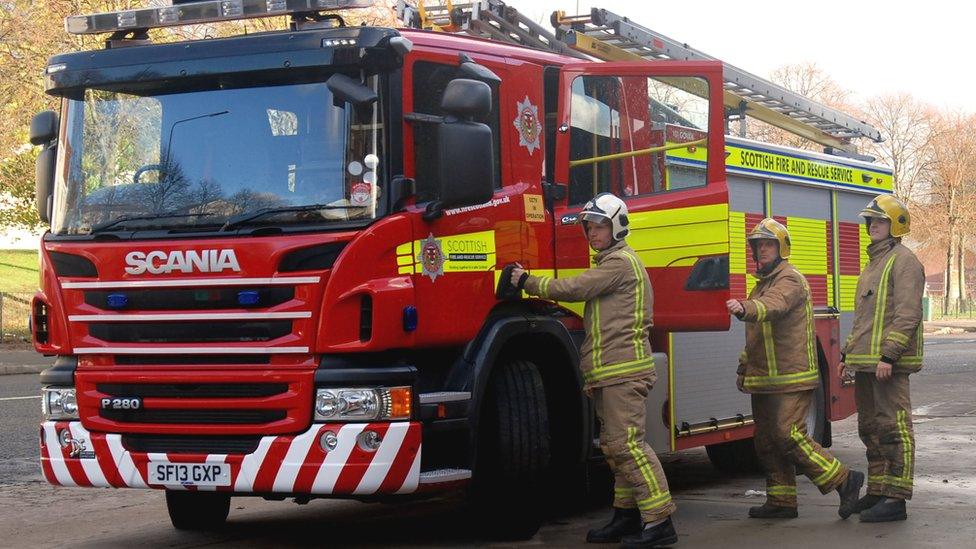
There were some positives from the mergers, including allowing for more equal access to specialist capabilities and support
The committee concluded that although reform had led to greater consistency of service across Scotland, as well as allowing for more equal access to specialist capabilities and support, a number of issues, particularly within Police Scotland, should be further addressed.
The committee's report on policing indicated that poor financial management, unclear lines of responsibility and a failure to focus on the views of officers and staff in the early stages of reform lie at the root of many of the problems faced by Police Scotland.
Among the issues highlighted were forecast savings not being realised, IT problems hampering police effectiveness and a string of well-publicised personnel problems resulting in senior management "instability and concerns over a lack of clear leadership" in the initial years of the reform process.
A need for an exemption for police and fire services from the payment of VAT was also highlighted in the committee's considerations.
The creation of national organisations meant that for several years they were liable for VAT, unlike other services throughout the UK which qualified for rebate because they were still funded through local councils.
In November 2017, Chancellor Philip Hammond announced he would address the anomaly, and extend the exemption to the Scottish fire and police services.
The report set out a range of recommendations for improving Police Scotland, including; an overhaul of police complaints processes to create a more "equitable, clear and fair system", a more proactive role by the Scottish Police Authority (SPA) in its oversight and scrutiny of new Police Scotland policies and to provide more robust financial projections.
'Personality issues'
The committee also suggested that the option of including the Scottish Parliament in the appointment process of the SPA chair should be explored, as well as stating that SPA and Police Scotland should demonstrate that recent improvements in leadership and governance would mean that previous "shortcomings caused by personality issues" could not reoccur.
Justice committee convener Margaret Mitchell MSP said: "Our police and fire services do a vital job keeping people in Scotland safe. It is imperative that the structures and regulations underpinning these organisations work well.
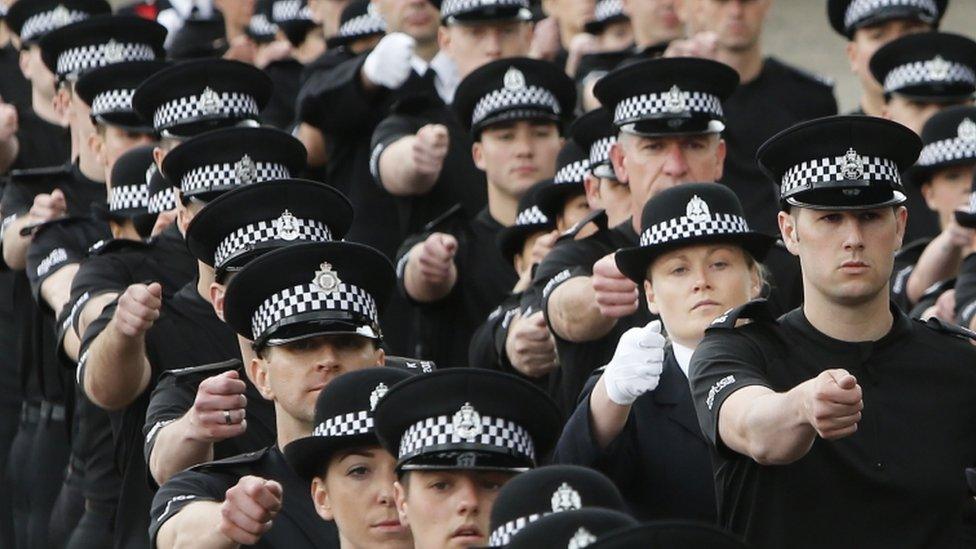
Recommendations included an overhaul of police complaints processes
"The Justice committee has found that some of the problems it has seen can be traced back to the frameworks and relationships created by the Act itself.
"These are not simply 'teething problems' of a new service bedding in, but systemic problems that must be addressed.
"The committee has identified a raft of necessary improvements to regulations, structures and practices. Members look forward to working closely with the Scottish government and the organisations created by the Police and Fire Reform Act to implement changes.
"Reform of these frontline public services is one of the biggest challenges undertaken since the start of devolution in Scotland. It is in everyone's interest that they succeed."
Police Scotland Chief Constable Iain Livingstone claimed Scotland is safer following the creation of a single national service.
He said: "The report makes clear Police Scotland has delivered significant benefits and it is encouraging to hear the committee describe the equity of access to national capacity as a 'success story for policing'.
"I agree with the committee that the single service has transformed the way it investigates rape and other sexual crimes, improved its approach to investigating murders and unexplained deaths, and its response to dealing with national threats.
"The report also recognised the single service has allowed the consolidation of support services, rather than cutting local, frontline officers."
Mr Livingstone highlighted the financial pressures facing the force but said technology, such as mobile devices, will allow officers to spend more time in local communities.
He also admitted the force was "not as engaged as we could have been" in the early years but vowed he will give local commanders and officers greater autonomy to police their areas within a national framework.
'Significant achievements'
Calum Steele, general secretary of the Scottish Police Federation, told the BBC's Good Morning Scotland programme the single force was operating with "one hand tied behind its back" when it comes to finances.
He said: "I'm quite disappointed with the report.
"You can't have a report which says there was no sound basis on which to make financial estimates but then concludes by saying there needs to be more sound financial management of those flimsy estimates.
"One thing that is missing from all of this is that despite delivering all these savings, and more, the service continues to face financial cuts and is in a position of a structural deficit and doesn't have the technologies which were expected to deliver even more savings."
Cabinet Secretary for Justice Humza Yousaf highlighted some of the positive conclusions of the report.
He said: "It has rightly recognised some significant achievements, including the creation of national capabilities in policing, described as 'a success story for Scotland' and improvements in how Police Scotland deals with sexual offences.
"This has been delivered alongside the Scottish government's commitment to protect Police Scotland's revenue budget during this parliament to deliver a total boost of £100m by 2021 and the announcement of a 6.5% pay deal for officers.
"The report also makes a number of recommendations which ministers plan to consider in full, alongside Police Scotland, SPA and SFRS over the coming months.
"The report recognises that Dame Elish Angiolini is leading a review into complaints and conduct in policing. It is right and proper that the review be allowed to conclude and its findings be published before considering the next steps."
- Published30 October 2018

- Published22 February 2018
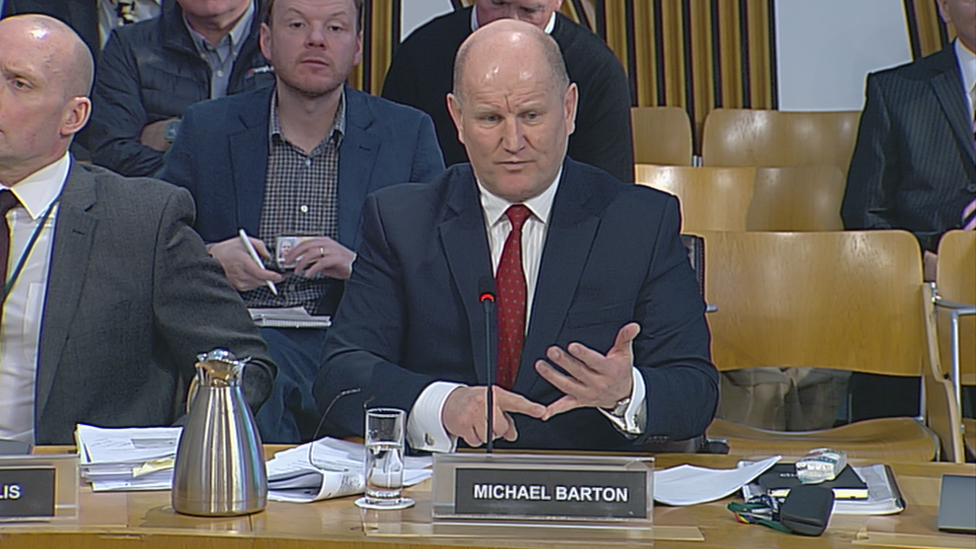
- Published7 February 2018
